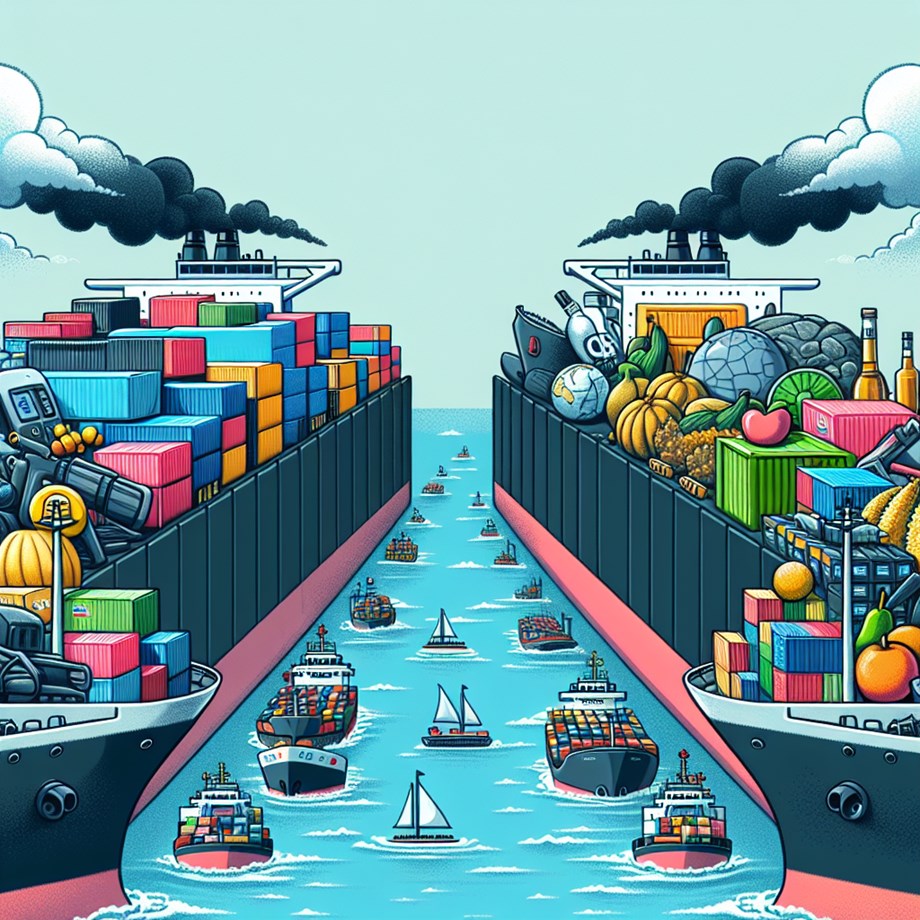Assessing The Impact: How Beijing Manages The Perception Of Trade War Losses To America

Table of Contents
State-Controlled Media and Narrative Management
The Chinese government leverages its tightly controlled media apparatus to meticulously craft and disseminate its narrative surrounding the trade war. This involves a sophisticated campaign of narrative management, designed to minimize the perceived negative impacts and emphasize China's resilience.
- Examples of positive spin: State media often highlighted instances of Chinese companies successfully navigating trade barriers, showcasing their adaptability and innovation. Success stories of Chinese firms expanding into new markets were amplified, overshadowing reports of economic hardship in affected sectors.
- Downplaying negative economic consequences: While acknowledging some challenges, the official narrative consistently downplayed the severity of the economic fallout. Negative economic indicators were often presented within a broader context of long-term growth and stability, minimizing their significance.
- Highlighting China's resilience and self-reliance: Keywords like "self-sufficiency," "domestic consumption," and "dual circulation" strategy were repeatedly emphasized, painting a picture of a nation capable of thriving even amidst external pressures. The focus shifted towards building a stronger domestic market and reducing reliance on foreign markets.
- Shifting focus to technological advancement and innovation: The trade war was framed as a catalyst for accelerated technological advancement and innovation, emphasizing China's commitment to becoming a global leader in key sectors like artificial intelligence and 5G technology. This narrative aimed to shift public attention away from economic losses and towards future gains.
Economic Data Manipulation and Transparency
Opacity surrounding economic data remains a significant characteristic of the Chinese economic system. This lack of transparency creates fertile ground for potential manipulation and makes it challenging to accurately assess the true impact of the trade war.
- Limited access to independent economic analysis: Independent economists and researchers face significant hurdles in accessing comprehensive and reliable data, hindering objective assessments of the trade war's economic consequences.
- Selective release of data showcasing positive economic indicators: The government strategically releases data that highlights positive economic trends, such as growth in certain sectors, while downplaying or delaying the release of data that reflects negative impacts.
- Challenges in verifying the accuracy and completeness of official statistics: The lack of independent verification mechanisms makes it difficult to ascertain the accuracy and completeness of official economic statistics, raising concerns about potential underreporting of negative impacts.
- Potential for underreporting of negative impacts: There are credible concerns that the true extent of job losses, business closures, and overall economic contraction resulting from the trade war may be underreported in official statistics.
Nationalism and Patriotism as Counter-Narratives
Beijing skillfully harnessed nationalistic sentiment and patriotic appeals to deflect criticism and counter negative perceptions of the trade war’s impact. This strategy effectively shifted the focus from economic losses to national pride and resilience.
- Promotion of national unity and resilience: The trade war was presented as a test of national unity and resilience, fostering a sense of collective purpose and determination. This narrative emphasized the need for national cohesion in the face of external challenges.
- Framing the trade war as a necessary challenge to strengthen China's economic independence: The trade war was reframed as a necessary challenge to accelerate China's economic independence and reduce its reliance on foreign markets. This narrative aimed to position the trade war as a catalyst for positive long-term changes.
- Using propaganda to instill a sense of national pride and determination: Propaganda effectively emphasized China's growing strength and global influence, portraying the trade war as a temporary setback that would ultimately strengthen China's position on the world stage.
- Emphasis on China's growing global influence despite the trade war: The narrative emphasized that despite the trade war, China continued to grow its global influence through initiatives like the Belt and Road Initiative, showcasing its resilience and economic strength.
Diversification of Trade Partners and Economic Strategies
Beijing's efforts to diversify its trade partnerships and adjust its economic strategies were strategically presented to the public as successes in mitigating trade war losses and strengthening China's economic independence.
- Highlighting the strengthening of economic ties with other countries: The government highlighted the strengthening of economic ties with countries along the Belt and Road Initiative, emphasizing the diversification of trade partners and reducing reliance on the US market.
- Promoting domestic consumption and investment as alternatives to reliance on US markets: The emphasis on the "dual circulation" strategy highlighted the government's efforts to boost domestic consumption and investment, reducing vulnerability to external economic shocks.
- Presenting these diversification efforts as successes in mitigating trade war losses: These initiatives were presented as evidence of China’s ability to weather the trade war and emerge stronger, showcasing its adaptability and economic resilience.
International Relations and Public Diplomacy
Beijing actively engages in international relations and public diplomacy to shape global perceptions of its economic performance during the trade war.
- Engagement in international forums to counter negative perceptions: China actively participates in international forums to present its narrative on the trade war, countering negative portrayals and promoting a more favorable image.
- Use of soft power to shape global narratives about China's economic strength and resilience: China strategically utilizes soft power tools, including cultural exchange programs and media outreach, to shape global perceptions and narratives.
- Strategic partnerships with international media outlets to disseminate favorable accounts: China cultivates relationships with international media outlets to ensure favorable coverage of its economic performance and achievements, countering negative reports from Western media.
Conclusion
Beijing's management of trade war perception involved a complex interplay of state-controlled media, economic data management, nationalistic appeals, and strategic international relations. The government employed a multi-pronged approach to minimize the perceived negative impacts of the trade war while simultaneously emphasizing China's resilience and growing economic strength. Critical analysis of official Chinese narratives is crucial, along with independent verification of economic data, to gain a comprehensive understanding of the true extent of the trade war's consequences. Further research is needed to fully understand the long-term effects of Beijing's management of trade war perception and its impact on both domestic and international relations. Further investigation into the effectiveness of these strategies is crucial for understanding the evolving dynamics of the US-China relationship.

Featured Posts
-
 Sony Revives Classic Play Station Console Themes On Ps 5
May 02, 2025
Sony Revives Classic Play Station Console Themes On Ps 5
May 02, 2025 -
 Kshmyr Ky Hmayt Myn Qwmy Ykjhty Ka Azhar
May 02, 2025
Kshmyr Ky Hmayt Myn Qwmy Ykjhty Ka Azhar
May 02, 2025 -
 Xrp Ripple Below 3 Risks And Opportunities For Investors
May 02, 2025
Xrp Ripple Below 3 Risks And Opportunities For Investors
May 02, 2025 -
 Xrps Meteoric Rise Could It Be Your Ticket To Millionaire Status
May 02, 2025
Xrps Meteoric Rise Could It Be Your Ticket To Millionaire Status
May 02, 2025 -
 Lotto 6aus49 Am 12 April 2025 Ueberpruefen Sie Ihre Zahlen
May 02, 2025
Lotto 6aus49 Am 12 April 2025 Ueberpruefen Sie Ihre Zahlen
May 02, 2025
